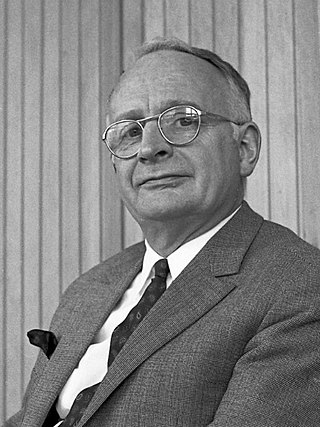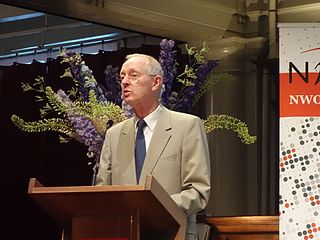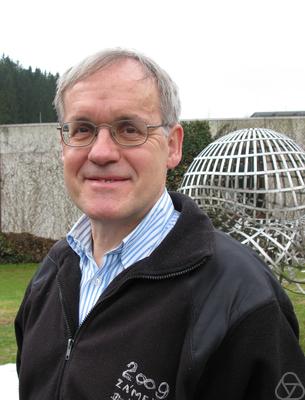The Centrum Wiskunde & Informatica is a research centre in the field of mathematics and theoretical computer science. It is part of the institutes organization of the Dutch Research Council (NWO) and is located at the Amsterdam Science Park. This institute is famous as the creation site of the programming language Python. It was a founding member of the European Research Consortium for Informatics and Mathematics (ERCIM).

Adriaan "Aad" van Wijngaarden was a Dutch mathematician and computer scientist. Trained as a mechanical engineer, Van Wijngaarden emphasized and promote the mathematical aspects of computing, first in numerical analysis, then in programming languages and finally in design principles of such languages.

Hendrik Willem Lenstra Jr. is a Dutch mathematician.

Richard David Gill is a mathematician born in the United Kingdom who has lived in the Netherlands since 1974. As a probability theorist and statistician, Gill is most well known for his research on counting processes and survival analysis, some of which has appeared in an advanced textbook. Now retired, he was the chair of mathematical statistics at Leiden University. Gill is also known for his pro bono consulting and advocacy on behalf of victims of incompetent statistical testimony, including a Dutch nurse who was wrongfully convicted and jailed for six years.
Onno Johan Boxma is a Dutch mathematician, and Professor at the Eindhoven University of Technology, known for several contributions to queueing theory and applied probability theory.

The Dutch Research Council is the national research council of the Netherlands. NWO funds thousands of top researchers at universities and institutes and steers the course of Dutch science by means of subsidies and research programmes. NWO promotes quality and innovation in science. NWO is an independent administrative body under the auspices of the Dutch Ministry of Education, Culture and Science. NWO directs its approximate budget of 1 billion euros towards Dutch universities and institutes, often on a project basis. Also, NWO has its own research institutes and facilitates international cooperation. Current president of NWO since April 1st, 2021 is Marcel Levi. Former NWO presidents include Stan Gielen, Peter Nijkamp and Jos Engelen.
Carel S. Scholten was a physicist and a pioneer of computing.
Andries Evert Brouwer is a Dutch mathematician and computer programmer, Professor Emeritus at Eindhoven University of Technology (TU/e). He is known as the creator of the greatly expanded 1984 to 1985 versions of the roguelike computer game Hack that formed the basis for NetHack. He is also a Linux kernel hacker. He is sometimes referred to by the handle aeb.

Paul Michael Béla Vitányi is a Dutch computer scientist, Professor of Computer Science at the University of Amsterdam and researcher at the Dutch Centrum Wiskunde & Informatica.
Ronald John Fitzgerald Cramer is a professor at the Centrum Wiskunde & Informatica (CWI) in Amsterdam and the University of Leiden. He obtained his PhD from the University of Amsterdam in 1997. Prior to returning to the Netherlands he was at the University of Aarhus.

Jan Karel Lenstra is a Dutch mathematician and operations researcher, known for his work on scheduling algorithms, local search, and the travelling salesman problem.

Alexander (Lex) Schrijver is a Dutch mathematician and computer scientist, a professor of discrete mathematics and optimization at the University of Amsterdam and a fellow at the Centrum Wiskunde & Informatica in Amsterdam. Since 1993 he has been co-editor in chief of the journal Combinatorica.
Marc Voorhoeve was a Dutch mathematician who introduced the Voorhoeve index of a complex function in 1976.
Jacobus Franciscus (Jacques) Benders was a Dutch mathematician and Emeritus Professor of Operations Research at the Eindhoven University of Technology. He was the first Professor in the Netherlands in the field of Operations Research and is known for his contributions to mathematical programming.
The Royal Dutch Mathematical Society was founded in 1778. Its goal is to promote the development of mathematics, both from a theoretical and applied point of view.

Monique Laurent is a French computer scientist and mathematician who is an expert in mathematical optimization. She is a researcher at the Centrum Wiskunde & Informatica in Amsterdam where she is also a member of the Management Team. Laurent also holds a part-time position as a professor of econometrics and operations research at Tilburg University.
Constance van Eeden was a Dutch mathematical statistician who made "exceptional contributions to the development of statistical sciences in Canada". She was interested in nonparametric statistics including maximum likelihood estimation and robust statistics, and did foundational work on parameter spaces.

Karen I. Aardal is a Norwegian and Dutch applied mathematician, theoretical computer scientist, and operations researcher. Her research involves combinatorial optimization, integer programming, approximation algorithms, and facility location, with applications such as positioning emergency vehicles to optimize their response time. She is a professor in the Delft Institute of Applied Mathematics at the Delft University of Technology, and the chair of the Mathematical Optimization Society for the 2016–2019 term.
Josephus C.M. Baeten is a Dutch computer scientist and mathematician, who has published on process calculus, concurrency theory, formal methods, model-based software engineering, model-based systems engineering and theory of computation.
Krzysztof R. Apt is a Polish computer scientist. He defended his PhD in mathematical logic in Warsaw, Poland in 1974. His research interests include program correctness and semantics, use of logic as a programming language, distributed computing, and game theory. Besides his own research, he has been heavily involved in service to the computing community, notably by promoting the use of logic in computer science and by advocating open access to scientific literature.










